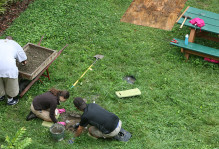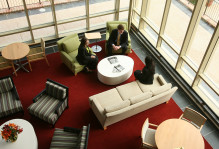From the Sides
A friend who is involved in the local food movement recently loaned me a book that has encouraged and inspired her work: Take this Bread, by Sara Miles. Miles is a one-time journalist in Mexico, cook in a New York City basement, and atheist who later became Director of Ministry at a church in San Francisco.
In the passage I read last night, she describes her experience in Mexico, where she went to a non-traditional peace college and stayed into her early twenties. Miles writes,
To begin with, my education had been not formal but rooted in experience and questioning: This made me distrustful of dogmas of all kinds. I couldn’t swallow the official party line of the left any more than I could automatically trust a government spokesman. To figure out what was really happening behind the clichés, I’d learned, meant a practice of looking not at the center but at the edges of things – at the unlikeliest and weakest people, not the most apparently powerful. It means asking lots of stupid questions, making rooms for inconvenient facts that didn’t fit a schema, and trying to remain honest about what I didn’t know.
Miles’ perspective reminded me of the many times I’ve been with groups of students on alternative breaks in communities that are new to us. We find ourselves immersed in a place that is caught up in powers that threaten the weakest, while local leaders have been plugging away for a long time against those powers. Sometimes, we’re baffled by these dynamics, because we’re looking at things through our own perspective. It doesn’t make sense why the teachers do what they do, or why people aren’t showing up to our seminars, or how anyone gets anything done when the roads are blocked every day by the very people who want change.
Several years ago, I joined a group of students in Tanzania as we developed educational sessions and testing days to increase awareness and knowledge to prevent the spread of HIV. Toward the end of our two weeks there, we visited with a local university president. We had met with great success (as we defined it) in some of our efforts, while remaining really confused about why other things we did just didn’t gain any traction. This local leader helped us to get beyond our own schema: “You may not be able to perceive them,” he said, “but there are many complex systems that people are functioning within here.” The systems we expected were not in place, but that didn’t mean that no systems were in place. He indicated that our job was not to look right at things and figure them out, but to look a bit sideways. To ask the stupid questions, and to get to know people well enough to even know what questions to ask. To find the inconvenient truths of the systems we could barely even see, and test them out with our new friends. To remain honest about what we have learned to perceive, and what we still don’t know.



No comments.
Comments are currently closed. Comments are closed on all posts older than one year, and for those in our archive.